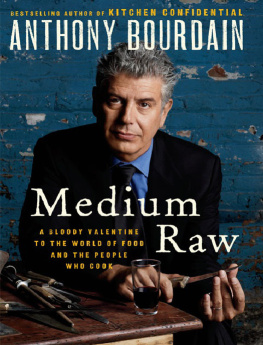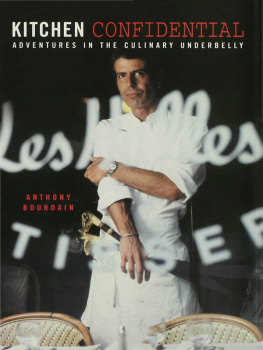
This electronic edition published in 2018 by Bloomsbury Publishing Plc
Bloomsbury is a registered trademark of Bloomsbury Publishing Plc
Copyright 2004 by Anthony Bourdain
All rights reserved
You may not copy, distribute, transmit, reproduce or otherwise make available this publication (or any part of it) in any form, or by any means (including without limitation electronic, digital, optical, mechanical, photocopying, printing, recording or otherwise), without the prior written permission of the publisher. Any person who does any unauthorised act in relation to this publication may be liable to criminal prosecution and civil claims for damages.
Published by Bloomsbury USA, New York
Library of Congress Cataloging-in-Publication Data
Bourdain, Anthony.
Anthony Bourdain's Les Halles cookbook : strategies, recipes, and techniques of classic bistro cooking / Anthony Bourdain, Jos de Meirelles and Philippe Lajaunie.
p. cm.
Includes bibliographical references and index.
ISBN: 978-1-58234-180-4 (HB)
ISBN: 978-1-60819-867-2 (eBook)
1. Cookery, French. 2. Les Halles (Restaurant) I. Title: Les Halles cookbook.
II. Meirelles, Jos de. III. Lajaunie, Philippe. IV. Title.
TX719.B736 2004
641.5944--dc22
2004002399
First U.S. Edition 2004
To find out more about our authors and their books please visit www.bloomsbury.com where you will find extracts, author interviews and details of forthcoming events, and to be the first to hear about latest releases and special offers, sign up for our newsletters.
TO NANCY


A man who is rich in his adolescence is almost doomed to be a dilettante at the table. This is not because all millionaires are stupid but because they are not impelled to experiment.
A. J. LIEBLING

introduction
This is not a cookbook. Not really.
It will not teach you how to cook.
The recipes, for the most part, are old standards, versions of which you can find in scores of other books.
Whats different about this volume is that the recipes are from Les Halles, the New York City restaurant where I have been, since 1998, the executive chef. Which is to say that they are the official recipes from the best goddamn brasserie/bistro in the country. These are the actual recipesscaled down, of course, from the rather larger-volume requirements of our very busy restaurant.
There may be thousands of bistros just like Les Halles in Francemany of them as goodbut there is only one in America. (Okay, actually there are four. We have three other joints: another one in New York, one in D.C., and one in Coral Gables, Florida. My loyalty is understandably to the Mothership on Park Avenue South, where, for no small amount of time, I toiled regularly behind the stove.) Les Halles is authentic, as authentic as any place can be outside of France.
This book aims to be a field manual to strategy and tactics, which means that in the following pages, I will take you by the hand and walk you through the process in much the same wayand in the same caring, sensitive, diplomatic toneas I would a new recruit in my restaurant kitchen.
Which means that if, from time to time, I refer to you as a useless screwhead, I will expect you to understandand to not take it personally. If you hang in there, do good work, show a little love and respect for the food, Ill probably buy you a beer later at the bar.
I will assume only that you can handle a knife with reasonable competence, without being a danger to yourself or others. That you like food. That you will show up on time. And I will show you, to the best of my ability, how to organize those great metaphysicals, your time, your space, your state of mind, so as to most efficiently attack each task and each recipe. You will learn how to set up for meals like a professional, how to square away your station so that you will be able to work in a lean, mean, clean, and organized fashion without tripping over yourself like some useless grab-ass and ruining my food.
So listen up. You will not do too many things at once. You will not lose your head. You will not run your area of operations (i.e., your kitchen) into a chaotic train wreck. You will learn to prioritize tasks like a cold-blooded professional, breaking down recipes into manageable sections so that final assembly, or pick-up, will not send you into gibbering paralysis (a.k.a. dans la merde, or in the weeds).
Cassoulet, for instance. You can take a peek now. The recipe is . Looks like a pretty damn intimidating recipe, right? Jesus! Look at all those ingredients! Dont sweat it, amigo. No professional makes cassoulet from scratch all in one afternoon, or even all in one day. Its actually a relatively relaxing, drawn-out process, mostly conducted in ones leisure time. The dish is broken down into a series of small functions, all performed at a luxuriously relaxed pace, often while doing something else. Its actually one of the easiest recipes on the menu to drill out. Once prepared, final servicein the restaurant and at homeis a gimme, a line cooks dream. Throw in pot, sprinkle with bread crumbs, toss in oven, and forget about it. This is the sort of dish professionals are happy to get an order for when cooking twelve other things at the same time.
If you can make a decent chili, you can make cassoulet. A lot of the same principles are at work. Dont let the French name fool you. Ever.
You should know that if you can already handle a knife and if you have a small, comfortable repertoire of American or ethnic household standards, then you are already way ahead of the vast majority of restaurant professionals when they first pick up a French knife and attempt frise aux lardons on the salad station.
Still scared? Still feel uncomfortable with all those ingredients, all those unpronounceable French names? An early traumatic experience at the hands of a snooty French waiter get your shorts all twisted? What is your major malfunction, dipshit? This stuff is EASY!
At Les Halles, and let me repeat here, the best, the most authentic frog pond in the whole damn U.S. of A., almost every single cook in its thirteen-year history has been a rural Mexican with no previous cooking experience. Almost everyone lacks any kind of formal training and entered the business as a dishwasher or night porter. If you think that they spent their childhoods whipping up Mexican regional favorites and developed a natural affinity for food, you are dead wrong, my friend. Ask my saucier to make chicken mole and youll get a blank stare and a middle finger. Back in the old country, Mom did that.
Now, of course, they are, pound for pound, some of the best cooks of cuisine bourgeoise in America. I would proudly put them up against any cheese-eating, long-lunch-taking, thirty-two-hour-a-week-working socialist clock-puncher from across the water. Any day. Theyd mop the floor with them. This is less a testimonial to my training abilities than it is evidence of the triumph of persistence, hard work, pure hearts, and a sense of humor.



















